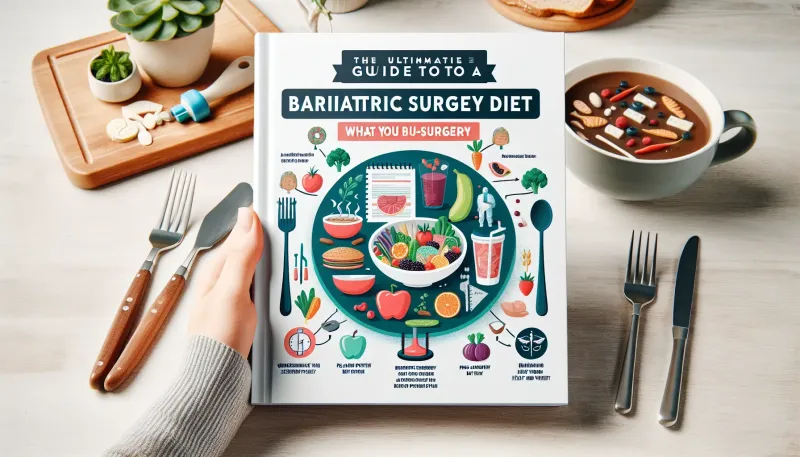The Ultimate Guide to a Bariatric Surgery Diet: What You Need to Know

Discover the essential guidelines and tips for a successful bariatric surgery diet. A comprehensive guide to help you navigate your post-surgery nutritional journey.
Introduction
Bariatric surgery is a life-changing procedure that can help individuals struggling with obesity to achieve significant weight loss. However, the success of the surgery greatly depends on the patient's ability to follow a strict dietary regimen afterward. This guide aims to provide you with a comprehensive understanding of the bariatric surgery diet, offering valuable insights and practical tips to ensure your post-surgery nutritional journey is as smooth and effective as possible.
Why a Bariatric Surgery Diet is Crucial
Following a bariatric surgery diet is crucial for several reasons:
- Promotes Healing: Proper nutrition aids in the healing process post-surgery, minimizing complications.
- Supports Weight Loss: Adhering to the dietary guidelines helps maintain weight loss achieved through surgery.
- Avoids Nutritional Deficiencies: Ensures you receive essential nutrients that your body needs for overall health.
- Prevents Gastrointestinal Issues: Helps avoid common post-surgery issues such as dumping syndrome or nausea.
Stages of a Bariatric Surgery Diet
1. Pre-Operative Diet
Before undergoing bariatric surgery, patients are typically required to follow a pre-operative diet. This phase is designed to shrink the liver and reduce surgical risk. The pre-op diet generally includes:
- High-Protein, Low-Carbohydrate Meals: Focus on lean protein sources and minimize carbohydrate intake.
- Caloric Restriction: A daily intake of approximately 800-1200 calories.
- Hydration: Increased water intake is vital, aiming for at least 64 ounces a day.
2. Post-Operative Diet Stages
The post-operative diet is typically divided into several stages, and it is important to follow these stages to allow the body to adjust to the new stomach size.
Stage 1: Clear Liquids
Immediately after surgery, a clear liquid diet is recommended to minimize stress on the stomach. This stage includes:
- Water
- Broth
- Decaffeinated tea
- Sugar-free gelatin
Stage 2: Full Liquids
After a few days, patients can transition to full liquids, which are slightly more substantial and nutritious. Examples include:
- Protein shakes
- Low-fat milk
- Low-sodium soup
- Unsweetened applesauce
Stage 3: Pureed Foods
Approximately two weeks post-surgery, pureed foods can be introduced. This stage involves foods that are blended to a smooth consistency:
- Pureed lean meats
- Mashed potatoes
- Pureed fruits and vegetables
- Low-fat, sugar-free yogurt
Stage 4: Soft Foods
About a month after surgery, the diet can include soft foods. These are easy-to-chew and digest foods, such as:
- Scrambled eggs
- Soft fruits
- Lean, finely chopped meats
- Cooked vegetables
Stage 5: Solid Foods
After approximately two months, most patients can start incorporating regular solid foods. It is important to reintroduce foods slowly and to chew thoroughly. Prioritize:
- High-protein foods
- Whole grains
- Fruits and vegetables
- Healthy fats
Nutritional Guidelines for Long-Term Success
Maintaining long-term success with a bariatric surgery diet involves adhering to specific nutritional guidelines:
- Protein Intake: Aim for at least 60-80 grams of protein daily. Focus on lean sources such as chicken, fish, beans, and low-fat dairy.
- Vitamin and Mineral Supplements: Due to the reduced capacity of the stomach, supplementation is often necessary. Common supplements include multivitamins, calcium, vitamin D, B12, and iron.
- Hydration: Drink at least 64 ounces of water each day. Avoid drinking during meals as it can disrupt digestion.
- Avoid Sugary and High-Fat Foods: Stick to nutritious foods that provide the necessary energy without excess calories.
Common Challenges and Solutions
1. Dumping Syndrome
One of the common issues post-bariatric surgery is dumping syndrome, where food moves too quickly from the stomach to the small intestine. To avoid this:
- Avoid high-sugar foods and beverages
- Eat smaller, more frequent meals
- Stay hydrated, but avoid drinking during meals
2. Nausea and Vomiting
Nausea and vomiting can occur if too much food is consumed or food is not adequately chewed. Solutions include:
- Eating slowly and mindfully
- Chewing food thoroughly before swallowing
- Identifying and avoiding foods that trigger nausea
3. Nutritional Deficiencies
Due to the restrictive nature of the diet, nutritional deficiencies can be a risk. Prevent this by:
- Following your healthcare provider's supplement recommendations
- Regular blood tests to monitor nutrient levels
- Incorporating a variety of nutrient-dense foods into your diet
Conclusion
Embarking on a bariatric surgery diet is a crucial step in ensuring the success of your weight loss journey. By understanding the different stages of the diet, adhering to nutritional guidelines, and being aware of potential challenges, you can maximize the benefits of your surgery and achieve long-term health and wellness. Remember to work closely with your healthcare provider to tailor the dietary recommendations to your specific needs, and always stay informed and vigilant about your nutritional intake.



















